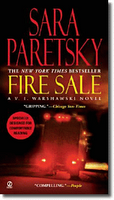
Paretsky writes:
When I first created V I [Warshawski], I gave her my own Scotch, Johnny Walker Black. As the years have gone by, I find myself able to drink less and less—a glass of wine with dinner is my sorry limit. Without realizing it, I’ve cut back V I’s rations as well. A reader recently wrote to complain that V I Warshawski—wasn’t drinking enough. I’m going to up the girl detective’s intake—she works hard, she’s fitter than I am, tougher in every way—I’m going to give her back her whisky bottle. But she will remain, as she always has been, a careful drinker: she doesn’t drink and drive, and when she’s hit on the head, she always has a hot sweet drink, sans booze. I worry that while this makes her more credible as a person, though, it sadly diminishes her noir credentials.These revelations appear at an interesting time: I was just wondering about all the fictional detectives who have traded in an alcohol addiction for a fitness obsession.
 I've just started Peter Spiegelman's Black Maps: his detective, John March, runs (a lot) and, I take it (these details are only gradually being revealed), is now through with what was once a serious alcohol jones that may be linked to the untimely death of his wife.
I've just started Peter Spiegelman's Black Maps: his detective, John March, runs (a lot) and, I take it (these details are only gradually being revealed), is now through with what was once a serious alcohol jones that may be linked to the untimely death of his wife.Just before that, I read Laura Lippman's new (and best yet) "Tess Monaghan" novel, No Good Deeds. Tess drinks a little wine and is not above the occasional hit of marijuana, but her real addiction is rowing.
And taunting me from the bookshelf is the new James Lee Burke novel,
 Pegasus Descending, which features the recovering alcoholic Dave Robichaux, another detective who battles his booze demons by running.
Pegasus Descending, which features the recovering alcoholic Dave Robichaux, another detective who battles his booze demons by running.Which reminds me that Samantha Kincaid, the D.A. created by Alafair Burke who features in three fine legal/crime mysteries, is a runner, too.
These exercising detectives might bear revisiting at some point. But now, back to the Spiegelman....
--Marshal Zeringue





